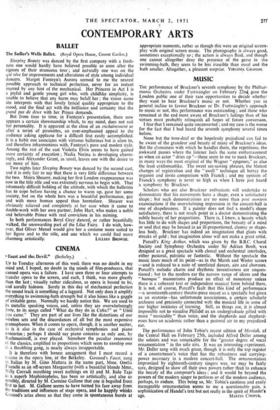MUSIC
THE performance of Bruckner's seventh symphony by the Philhar- monic Orchestra under Furtvvangler on February 22my gave the London public one of their rare opportunities to decide whether they want to hear Bruckner's music or not. Whether you in general incline to favour Bruckner or Dr. Furtwiingler's approach to music or not, this performance was outstanding ; and those who remained at the end more aware of Bruckner's failings than of his virtues must probably relinquish all hopes of future conversion.
I fear that I remained quite unconverted ; and my case is the worse for the fact that I had heard the seventh symphony several times before.
None but the tone-deaf or the hopelessly prejudiced can fail to be aware of the grandeur and beauty of many of Bruckner's ideas. But the clumsiness with which he handles them, the repetitions, the awkward pauses where the listener feels the same embarrassment as when an actor " dries up "—these seem to me to mark Bruckner, in many ways the most original of the Wagner " cpigones," as also the least craftsmanlike. The sweet sec-sawing phrases, the blatant changes of registration and the " swell " technique all betray the organist and invite comparison with Franck ; and my opinion of Franck's symphony is never so high as when I have just heard a symphony by Bruckner.
Scholars who are also Bruckner enthusiasts will undertake to demonstrate that his movements have a shape, even a satisfactory shape ; but such demonstrations arc no more than post marten: examinations if the overwhelming impression in the concert-hall is one of shapelessness. If a painter does not rind a model's shape satisfactory, there is not much point in a doctor demonstrating the subtle beauty of her proportions. There is, I know, a beauty which has little to do with shapes and proportions, the beeauty of a mind or soul that may be housed in an ill-proportioned, clumsy or shape- less body. Bruckner has indeed an imagination that glints with streaks of gold ; but imagination alone will not make a great artist.
Purcell's King Arthur, which was given by the B.B.C. Choral Society and Symphony Orchestra under Sir Adrian Boult, was designed as a great spectacle with choral and orchestral interludes, either pastoral, patriotic or fantastic. Without the spectacle the music loses much of its point—as in the Marsh and Winter scenes —and is reduced to a suite of unrelated dances, airs and choruses. Purcell's melodic charm and rhythmic inventiveness are unques- tioned ; but to the modern ear the narrow range of idiom and the " baroque " mannerisms produce an effect of monotony unless there is a coherent text or independent musical form behind them. It is not, of course, Purcell's fault that this kind of performance —a seventeenth-century theatre-piece meant as a spectacle but given as an oratorio—has unfortunate associations, a certain scholarly archness and preciosity connected with the musical life in some of our higher institutes of learning. Still, as things are, it is almost impossible not to visualise Philidel as an undergraduate gifted with more " musicality " than voice, and the shepherds and shepherd. esses have an academic rather than a pastoral air to my prejudiced ear.
The performance of John Tobin's recent edition of Messiah, at the Central Hall on February 25th, included Alfred Miler among the soloists and was remarkable for the "greater degree of vocal ornamentation " in the solo airs. It was an interesting experiment. Mr. Deller sang with much grace, though it is only the top register of a countertenor's voice that has the robustness and carrying- power necessary in a modern concert-hall. The ornamentation improvised by eighteenth-century singers was, we may be fairly sure, designed to show off their own powers rather thari to enhance the beauty of the composer's ideas ; and it would be beyond the powers of the modern singer to perform or of the modern audience, perhaps, to endure. This being so, Mr. Tobin's cautious and easily manageable ornamentation seems to me a questionable gain, a sophistication of Handel's text but not really in the spirit of Handel's


































 Previous page
Previous page